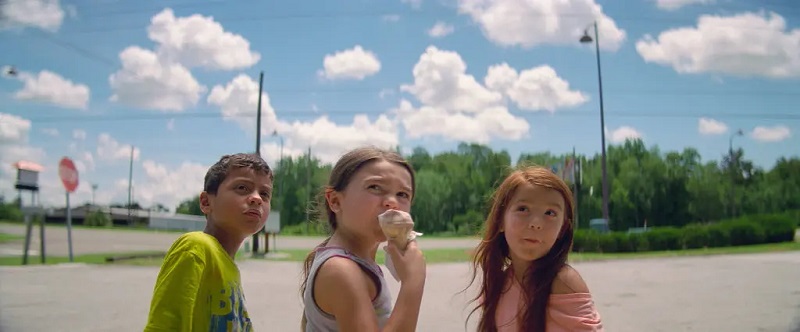
Cinema about the marginalized pockets of the world is becoming more common, but back when The Florida Project first came out, what director Sean Baker was doing was quite new. The film features what he calls the hidden houseless, guests but never permanent residents of the lilac-coated Magic Inn and Suites motor hotel. Even when such films come to be, they normally focus on the pain and sorrow of the community’s lot in life, rather than joy.
Not so with The Florida Project, with a first half that acts as a slice of life story as adorable, mischievous kids experience one heck of a summer. Their unspoken leader is Moonee, a precocious brunette with a thousand schemes and a luminous smile. From her innocent childlike perspective, she lives in a place just as magical as Disney World, located within walking distance from her front door.
Moonnee spends much of the movie running around the inn and its neighboring properties — other inns, the local ice cream parlor, abandoned condos — causing havoc and having a blast, collecting friends like she’s the Pied Piper of Hamlin. Her penchant for causing trouble and not taking responsibility makes perfect sense once you meet her mother, Halley, who lives paycheck to paycheck and conning her way into just one more meal that will feed her precious family of two. When the checks run out, Halley’s plans become even more extreme.
On first watch, this all just seems like a shocking episode of Jerry Springer – a car crash we love to stare at and feel glad it’s not us. But on multiple viewings, things begin to look much different. We understand that Moonnee is allowed to feel innocent, guiltless, and free because of two adults in her life: her mother Halley, whose parenting has inoculated her from understanding how many ugly sacrifices she has made, and Bobby, the landlord and caretaker of The Magic Inn and Suites, who tries his best to keep the wolves outside the gates.
Caretaker Bobby serves as sage, prophet, protector, and king. While not quite a god figure, he’s a model of an empathetic but tough human being. He’s stern and insistent on the rules, but he’s also indulgent of the sheep in his keep. His kindness even extends to the ibises who wander onto the property: “There’s cars coming through here.” Bobby is a rare light in this difficult world, smoking cigarettes as he looks over his domain.
The Florida Project reminds us to look a little closer at people we dismiss. To the system, the residents of Magic Inn and Suites might be seen as the dregs of society — just taking up space. Yet there’s beauty to be found there: Halley, playing in the rain with her daughter; Moonnee taking Jancey on a “safari” to see cows; Bobby, fiercely protecting the kids from a predator like a roaring lion; a magical birthday lit by fireworks on a hot summer night; and a lone cigarette, shining like a beacon against the twilight. — Lindsey Dunn (2025)
Arts & Faith Lists:
2017 Arts & Faith Ecumenical Jury — #3
2025 Top 100 — #94